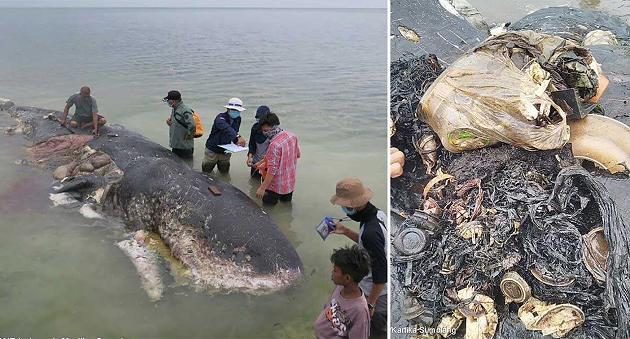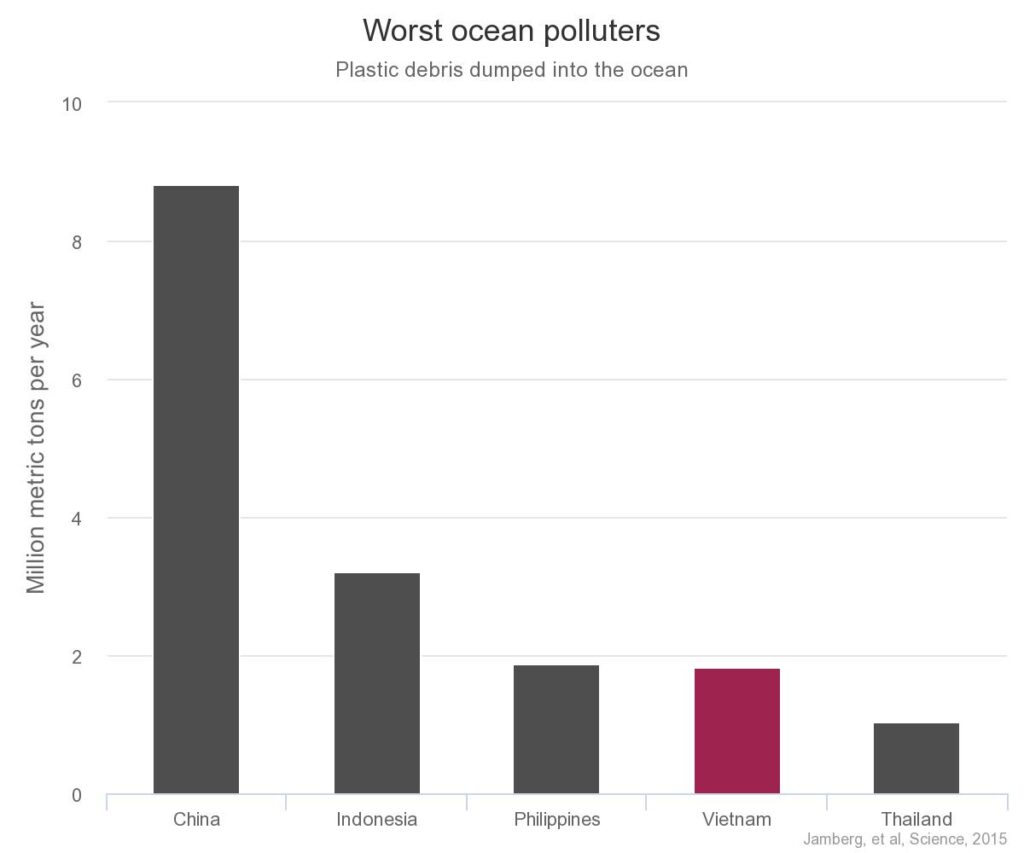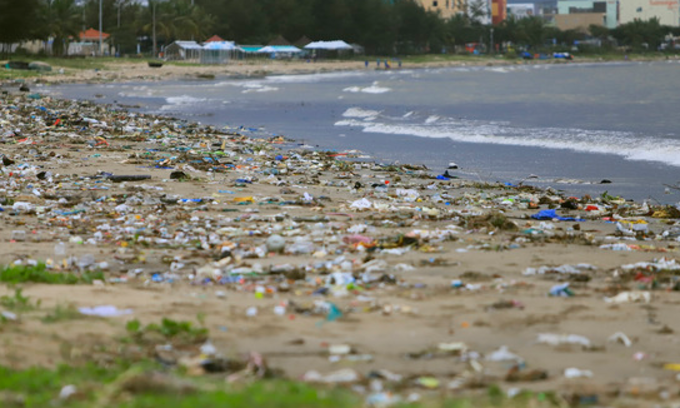The wealth of Saigon’s population has increased rapidly within the last 15 years, as well as its consumerism.
Single-use plastic, known for its versatile usage and cheap production, is consumed at a record high in Vietnam’s most populated city.
Its utilitarian characteristics make it the most common packaging material for anything, varying from food containers to plastic bags, to drink-to-go cups.
The human’s laziness of enjoying convenient plastic usage, in addition to a lack of education about responsible plastic consumption, has caused a widely spread, highly unsustainable plastic consuming habit.
Do you want to buy some food and eat it at your office or at home?
No problem, as you will get a polystyrene package with the food inside, a plastic spoon, as well as a plastic bag to carry all this conveniently and easy.
And what could fit a lunch better, than a delicious orange juice?
The friendly lunch lady smiles bright, as she pours the juice into a plastic cup and covers it with a plastic cap. The plastic straw glides smoothly through the cap’s hole.
Her fast movements reveal that she does this a lot, as she packs your cup adroitly into a special plastic bag, which is only made for the purpose that one can carry its cup like a bag.
You get two plastic bags which are easy to carry, pay and leave.
“Mmmmh”, is all you can say as you enjoy your delicious lunch and the orange juice to-go. 20 minutes later, deeply satisfied, you pack the polystyrene bag, the fork, as well as the cup back where you took it from (the plastic bag) and throw it all together into the next bin.
Your stomach is filled and the lunch lady doesn’t have to clean any dishes. Everybody is happy, everything is perfect, isn’t it?
It would, if there wouldn’t be an aftermath of this convenient single-use plastic consuming habit.
This aftermath is environmental pollution due to plastic trash, in an extent as humanity has never experienced it before.
Just a minority of countries in the world have effective trash disposal or even trash recycling systems, while the majority of countries (especially in Asia) store their trash at unsustainable landfills
This consequence of disproportionate single-use plastic consumption, is responsible for the terrifying warning of the Ellen MacArthur Foundation, that there will be more plastic than fish in our oceans by 2050, if humanity won’t undergo rapid changes in its consumption and disposal of plastic trash.
Vietnam’s attempts to handle its trash
As one of the fastest growing economies of South East Asia, Vietnam fails in terms of
According to the Vietnamese Institute of Strategy and Policy on Natural Resources and Environment, the country discards more than 30 billion (!) plastic bags per year, of which only 17% are reused.
The big Vietnamese cities all have trash collection systems, which transport the trash to landfills, while only 40-60 percent of Vietnam’s rural areas have a similar system. The uncollected trash becomes a danger to marine life, as it just gets dumped into rivers and streams, which transport it into the ocean.
Once in the ocean, plastic becomes a serious danger for marine life, as it often gets mistaken for food.
A tragic example is a whale which was found dead on a beach in Indonesia. Investigators found 5.9kg (13lbs) of plastic waste in the animal’s stomach containing 115 plastic cups, four plastic bottles, 25 plastic bags, two flip-flops, a nylon sack and more than 1,000 other assorted pieces of plastic.

Indonesia is worldwide the second biggest contributor to plastic trash in our oceans.
Left in the ocean, plastic slowly degrades into microplastic, which gets eaten by plankton and fish.
At this point, plastic enters the human food chain and gets into our bodies. Once in the human body, microplastic can cause grave diseases such as cancer or infertility.
Microplastics have been found in tap water around the world, in soft drinks, in the oceans and in flying insects. A recent study led by the Medical University of Vienna even found microplastics present in human stool.
Philipp Schwabl, a researcher at the university, said
“ This is the first study of its kind and confirms what we have long suspected, that plastics ultimately reach the human gut. Of particular concern is what this means to us, and especially patients with gastrointestinal diseases.”
The main problem of plastic consumption is the fallacy that people tend to believe their plastic trash won’t harm the environment, as long as they dispose it in a trash can. Once in the trash, the problem seems to be solved but it isn’t.
Even if trash gets disposed in a trash bin and then transported to a landfill, it still is a threatening danger to ouroceans, as landfills get flooded easily during the rainy season and therefore spread to neighboring villages and rivers, which transport the trash to the ocean.
Consequently, Vietnam was named fourth out of five countries (after China, Indonesia

8 000 of the country’s 18 0000 metric tons of daily produced plastic trash are from Vietnam’s most populated city, Saigon, also known as Ho-Chi-Minh City.
Saigon’s attempts against being Vietnam’s major plastic trash producer
Vietnam’s recycling systems are still in its infancy. Trash is not categorized by the Vietnamese population yet, nor by the trash collectors
Those “professional dumpster divers” sell their items to a “dong nat” or “ve chai”, a trader of recyclable or reusable trash, who wander around the streets of Saigon.

Unfortunately, not all neighborhoods have their dumpster divers and lot of trash ends up unrecycled in huge landfills, such as the Da Phuoc solid waste trash site, south of HCMC.
In addition to that, this recycle system is not as effective as it would be, if it would address plastic trash producers directly to separate their trash, as the trash collection systems of many European countries already do.
Furthermore, the “professional dumpster divers” just collect a minority of the actual possibly recyclable plastic trash.
Disgruntled and shocked by the unsustainable waste management of Saigon, more and more organizations try to make a change towards a more sustainable Saigon.
Ton Duc Thang University
A great example are the student’s and professor’s efforts of the Ton Duc Thang University in Ho-Chi-Minh City.
Socializing new habits in Vietnam, such as reducing, reusing and recycling of plastic trash, is a challenge which the Faculty of Environment and Labor Safety wants to face and improve.
The reduce and recycling of plastic trash became a major topic and therefore the faculty launched a plan to start own recycling projects and organize campaigns to raise awareness for environmental pollution.
The ideas for detailed implementation are guided as follows:
- Step 1: “Waste-to-Worth Attention Booths
” : Organizing the exchange of plastic utensils, packaging and bottles at the place of supply for purchases discount to enhance the sense of environmental protection and reduce waste in the community. - Step 2: “Awareness campaigns and workshop”: organizing widely awareness campaigns on collecting and recycling plastic waste.
- Step 3: “Long-term projects”: implementing projects to socialize the plastic waste recycling by using plastic waste to produce energy, using enzymes to accelerate the process of biodegradation of plastic waste.
More at: www.tdtu.edu.vn/en
Vietnam Recycles
Another example is the NGO “Vietnam Recycles”, a free take-back program initiated by producers of electrical and electronic equipment for used or defective electronic products to ensure their safe and sustainable recycling.
The program offers a safe collection and professional procession of electronic products, to achieve maximum recovery of natural resources and ensure highly professional waste treatment.
So far, this program does only exist for electronic programs but is a great model for effective and profitable recycling, which is also applicable for the recycling of plastic trash.
More at: www.vietnamrecycles.com
Zero Waste Saigon
As a young brand, Zero Waste Saigon, already influences thousands of Vietnamese to think more sustainable and reduce their plastic consumption by doing educational work in schools, as well as online.
Zero Waste Saigon has shops as well, in which they sell good alternatives to single-use plastic, such as metal straws or reusable bags.
More at: www.zerowastesaigon.com
Clean Up Vietnam
In cooperation with major clean up groups around the country, Clean Up Vietnam organizes clean up days, during which volunteers are collecting trash, as well as campaigns to educate the Vietnamese population about the concept of reducing, reusing, and recycling.
Furthermore, the educational work which Clean Up Vietnam and its partners do in schools all across the country, is an effective method to raise awareness for the consequences of human’s excessive plastic consumption.
More at: www.cleanupvietnam.org
The future of plastic
Vietnam’s current trash collection, as well as recycling system, is not keeping up with the rapidly increasing amount of trash which 95 million people produce.
Therefore, it is a fundamental part of changing deeply rooted consuming habits by educating as much young Vietnamese (and any other nationality’s) people as possible about the momentous outcomes environmental pollution by plastic trash will have on their lives in the nearby future.
As the importance of sustainable plastic usage will raise within the nearby future due to already realizable outcomes of environmental pollution, such as the terrific warning that there will be more plastic than fish in the ocean by 2050, chances are good that consumer habits will change.

Plastic itself is not the root of the problem, it’s the way how we, humans, consume and dispose it.
Therefore, we have to ask ourselves, do I really need this plastic bag, do I really need to get a juice to-go and the most important question:
Do I want to be one of the contributors who turn our ocean into a plastic ocean by daily consuming single-use plastic?
We, as individuals have to take much more responsibilities when consuming plastic, not only in Vietnam.
To ban plastic, especially single-use plastic from one’s life is a radical, but highly effective step as it lowers the demand for plastic, as well as the worldwide consumption of plastic.
As long as there aren’t well working, sustainable, recycling systems in the area we live, we have to be aware, that the majority of plastic, which we daily consume,will end up in the oceans sooner or later.
If the majority of plastic using individuals will undergo this great change in its convenient behavior with plastic, it is possible to safe our environment and ourselves from the worst-case scenario in which more plastic than fish exists in our oceans.